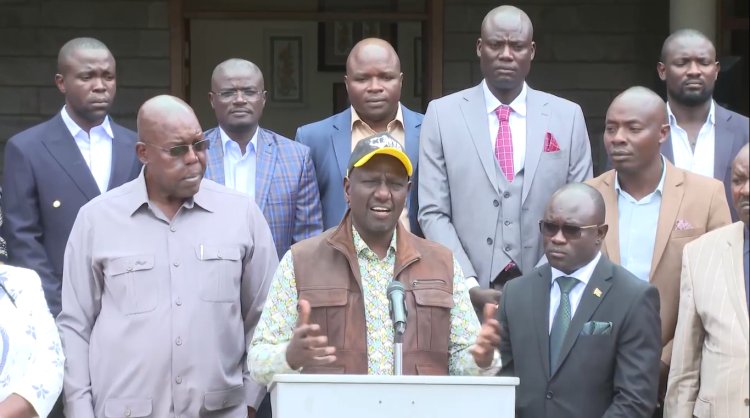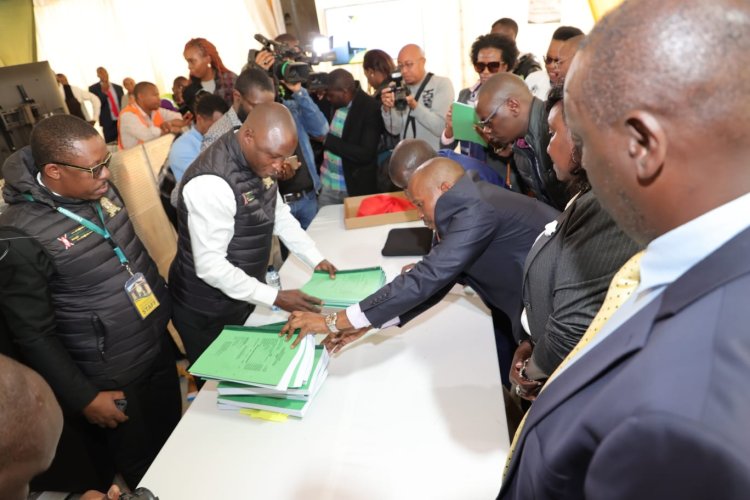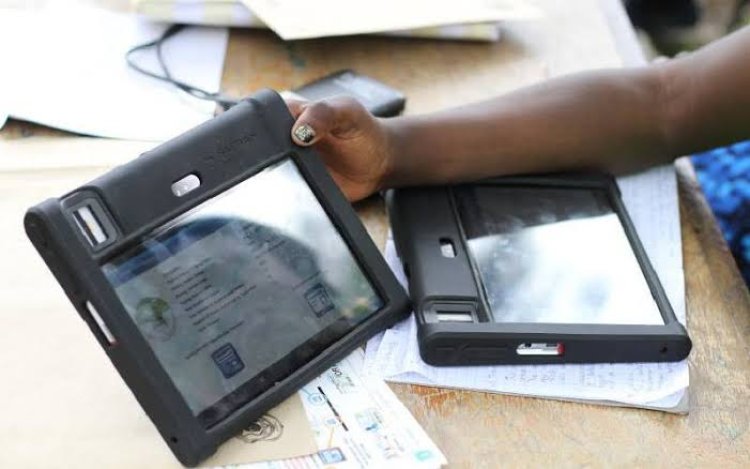Why Ruto Is Warning Supreme Court Against Declaring Raila President-Elect
Raila is calling upon the apex court to nullify the presidential election results that saw Ruto beat him in the August 9 polls, citing irregularities in how the process was carried out.

President-elect William Ruto filed his response at the Supreme Court of Kenya countering the demands made by Azimio La Umoja Presidential candidate Raila Odinga and his running mate Martha Karua in their petition.
Raila is calling upon the apex court to nullify the presidential election results that saw Ruto beat him in the August 9 polls, citing irregularities in how the process was carried out.
Moreover, the former Prime Minister called upon the Independent Electoral and Boundaries Commission (IEBC) to tally and verify votes and declare him and Martha Karua as President-elect and Deputy President-elect respectively, rather than advocate for a rerun.
However, Ruto took fault with Raila's demand to be declared the winner yet he claimed that none of the candidates met the 50+1 per cent threshold used to declare the winner of a presidential election.

He also believed that the Supreme Court has no jurisdiction to grant what Raila and Martha are seeking in the petition, arguing that doing so would go against Article 140 (3) of the Constitution.
"If the Supreme Court determines the election of the President-elect to be invalid, a fresh election shall be held within sixty days after the determination," the Article states, meaning that Ruto would rather go for a re-run than witness Raila declared president-elect instead.
Ruto also noted that Raila has been seeking the nullification of presidential elections and a subsequent re-run for three years running, citing the three petitions he filed in 2013, 2017 and 2022.
The 2017 petition went in his favour, though he pulled out of the re-run, handing President Uhuru Kenyatta an unopposed victory.
"The first distinct common feature that underlies Raila's thirty-year pattern of strikingly similar acts after every presidential election is disingenuous disputation of presidential election results as a means of forcing the winner to share power through unconventional and extra-constitutional government arrangements popularly known as "handshake," read the petition in part.
Ruto also claimed that it was commonplace for Raila to prompt the removal of members of the electoral commissions years down the line and insistence that the polls be repeated under a different body, even one composed of foreign nationals.
"Specifically, Raila has orchestrated vilification and ouster campaigns against the members of the defunct Samuel Kivuitu-led Electoral Commission of Kenya (ECK) after the 2007 presidential election, the lssack Hassan-led Independent Electoral and Boundaries Commission (IEBC) after the 2013 presidential election; and the Wafula Chebukati-led IEBC after the 2017 presidential election," added the response.
He argued that Raila has no genuine grievance against the conduct or result of the election but merely wants to have another bite at the cherry through a judicially forced re-run, adding that this year's polls have seen Kenyans move on with their lives following the declaration of the results.
Manipulation of IEBC system
Ruto argued that the Azimio coalition in their petition produced falsified logs in support of their claims on the alleged external IP address on the log-in page of the IEBC portal and the alleged hacking/infiltration of IEBC systems. In addition, he revealed that they were the same logs Raila submitted in the 2017 petition.
"The inevitable inference from falsifying the logs is that Raila may have misled this Honourable Court to nullify the 2017 presidential election based on falsified evidence. I earnestly urge this Honourable Court to peruse the Affidavit sworn by Eric Mulei Kitetu on the falsity of the logs," Ruto said.
Raila and his team argued that some forms were deleted, altered or replaced on the IEBC portal. Ruto however argued that he was unaware of the allegations and that all the presidential candidates should have in their possession copies of the Forms 34A that were issued to party agents at the polling station and verified at Bomas.
Ruto also revealed that he was not privy to the alleged "interception," "staging," "alteration", and "dumping" of more than 11,000 Forms 34A on the IEBC portal in just eight minutes, something he termed as humanely impossible. In addition, he stated that Raila may have copied former US President Donald Trump's allegations in 2020 on the same.
Cherera and the 3 rogue IEBC Commissioners
On the matter of Juliana Cherera, Justus Nyang'aya, Francis Wanderi and Irene Massit rejecting the presidential results, Ruto argued that the four fully participated in the tallying, verification and announcement of election results without demure, for six days and six nights, under the full glare of local and international Press/media.
“The disaffected Commissioners only purported to disown the tallying and verification exercises after completion, and my victory became apparent,” he argued.
Ommission of 27 constituencies
Ruto argued that the IEBC (including the disaffected Commissioners and the Secretariat) tallied and verified election results for the allegedly omitted 27 Constituencies under the full glare of local and international press/media and in the presence of candidates' agents, accredited observers, foreign dignitaries and other persons lawfully present at the National Tallying Centre.
The four commissioners, he added, had announced the verified results of the 27 constituencies at the National Tallying Centre at the Bomas of Kenya with many eyes aforementioned watching.
Moreover, Ruto stated that Raila's agents had caused chaos at the centre interfering with the announcement of the results of the 27 constituencies.
IEBC Subverting the Will of the People
Ruto argued that the IEBC conducted the election in compliance with the principles stipulated in the Constitution and the Elections Act, adding that they took into consideration the Maina Kiai case which stated that the results read at the polling station, on Form 34A, were final.
“The voting, vote counting and declaration of the result of the election were conducted at polling stations in a free, fair and transparent manner.
“Tallying and verification of election results at Bomas of Kenya were based on original Forms 34A and original Forms 34B physically delivered by Constituency Returning Officers to the National Tallying Centre,” he stated.
Rejected Votes and 50+1% Constitutional Threshold
Ruto revealed that he was informed that the Supreme Court had settled on the issue of inclusion of rejected votes in computing the 50 per cent plus 1 constitutional threshold in 2013 and 2017 in cases filed by Raila.
“I earnestly believe that perusal of the original Forms 34A, original Forms 348 and the original Form 34C will easily and quickly confirm that I attained the 50 per cent +1 threshold set,” he stated.
Failure of KIEMS Kits
Ruto was informed that the IEBC had established complementary mechanisms to facilitate the identification of voters upon the failure of some KIEMS Kits.

IEBC registration clerks at Madaraka primary school using the Kenya Integrated Elections Management System (KIEMS) kit. /STANDARD DIGITAL
John Githongo Shocking Affidavit.
Former journalist and whistleblower, John Mark Githongo alleged that 56 individuals were hired to infiltrate IEBC systems during the election period. Ruto however argued that the affidavit is inadmissible to the extent that it comprises entirely of hearsay and calumny, contrary to law on affidavit evidence.
He noted that he was also unaware of the existence of an "external address not belonging to the IEBC" allegedly used to intercept and manipulate Forms 34A.
Chebukati and IEBC
Ruto stated that he was unaware of the allegations raised against Chebukati concerning the corporate mandate of the IEBC as an institution and his role as the chairperson and national returning officer.
He further warned that ousting Chebukati from office would plunge the country into a constitutional crisis.






